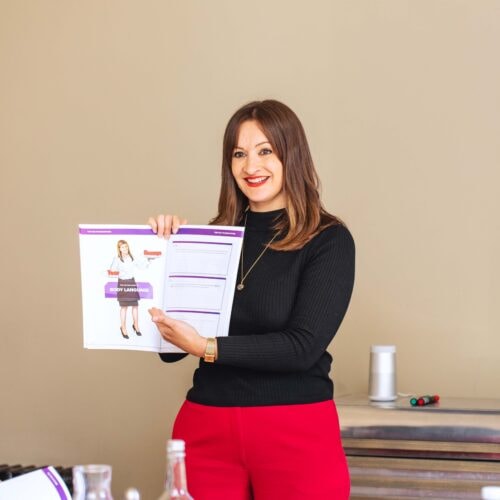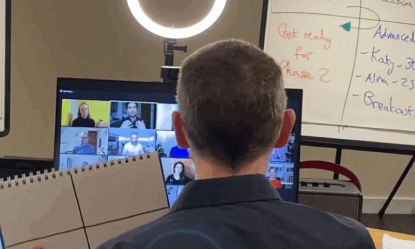Do you, um, have a problem with, like, you know, filler words when you’re speaking?
Estimates suggest that the average speaker uses a ‘filler word’ every 12 seconds, but overuse of ‘ums’, ‘ahs’ and other filler words and phrases can be a real barrier to effective communication.
At Body Talk, we’ve helped over 120,000 professionals worldwide sharpen their speaking skills, and cutting down on filler words is one of the fastest ways to sound more credible, composed and in control.
This guide will show you what filler words are, when they become a problem, and how to reduce them – so your message lands with maximum impact, every time.
Key takeaways
- Filler words don’t define you — they’re simply signals that your brain needs space.
- When you slow down and use purposeful pauses, you instantly sound more confident and composed.
- Preparation sharpens your thinking, helping you speak with clarity even under pressure.
- The more aware you are of your habits, the easier it becomes to replace fillers with impact.
- With the right tools, anyone can speak with authority, conviction and calm.
‘Filler words’ meaning: What are filler words?
Filler words are extra words or sounds we often slip into speech to fill a pause, like “um,” “you know,” or “like.” They’re signals to the listener that we haven’t finished speaking, buying us time while we figure out what to say next.
These discourse markers might seem harmless, and sometimes they are – but overuse can leave you stumbling over words, diluting your message and undermining your confidence. Understanding how filler words work is the first step in reducing them and speaking with impact.
Examples of common filler words in conversation
In English, filler words are often used together in combinations. They can be thought of as a verbalisation of our thought process.
Use our filler words list below to spot what’s holding you back, and start replacing hesitation with impact.
Um, uh and er
The classic pause fillers, used when you’re thinking of your next word or idea.
Like
Often pops up in casual explanations or stories, sometimes to soften statements.
You know
Used to check for understanding or agreement, though overuse can signal uncertainty.
I mean
Helps clarify or reframe a point, but repeated too often it can undermine confidence.
Right?
Seeks validation from the listener, often at the end of a statement.
Really or very
Intensifiers that can overemphasise points unnecessarily, sometimes masking uncertainty.
Just
Minimises statements or softens requests, which can make you sound less assertive.
Literally
Literally means “exactly,” but in spoken language, it’s often used to exaggerate rather than clarify.
What are the negative effects of using filler words?
Using too many filler words when you’re speaking can negatively affect your credibility, whether you’re giving a presentation, speech or even as part of a simple conversation.
Stumbling over your words can make you look ill-prepared or nervous, giving the impression that you are unsure of what you are saying or arguing. Filler words also disrupt the flow of your speech, causing audiences to disengage and making your ideas more difficult to understand.
If you’re trying to keep your audience engaged with emotional stories or important research, filler words often dilute your message.

Why do we use filler words?
There are a number of reasons why people use fillers in communication. These include:
Nervousness and speaking too fast
75% of people experience some degree of fear of speaking in public, so if you feel nervous when speaking, you’re certainly not alone. And while being nervous itself isn’t a problem (a certain amount of nerves can help us focus), it can cause us to speak too quickly as we try to rattle through our speech to get it over with.
However, when our speech is too fast, it can be difficult for our brain to ‘catch up’ and identify what the next word, phrase or statement is going to be. This causes us to overuse filler words to plug the ‘thinking time’ gap.
Not preparing
When you haven’t prepared what you are going to say, you can often find yourself at the end of a sentence or idea and not knowing where to go next. This can mean we struggle to communicate the essence of an idea concisely or have difficulty summarising or linking concepts together.
Again, this is where we tend to use filler phrases to try and buy ourselves time to think over our ideas and find the right words to express them. But for a public speaking audience, this can come across as distracting, unconvincing, or difficult to follow.
Worrying about being judged
Fillers in speech can sometimes arise when we feel awkward and under pressure when we are in the limelight.
Making eye contact with people can increase the feeling of being in the spotlight and make speakers feel uncomfortable. When we are constantly focused on ourselves and how others may judge our ideas, we can hesitate, plugging the gap with filler words.
Handling objections (and not knowing what to say!)
If you are faced with an objection or a difficult conversation, knowing how to respond immediately can be difficult. This is another situation in which people tend to use filler words, as their brains try to process a response quickly – but again, this can come across as lacking in conviction.
When is it okay to use filler words?
You will never be able to avoid using filler words altogether (unless you memorise and rehearse a speech word for word – but this isn’t practical to do for every business meeting or conversation).
Even expert speakers use some fillers, with the best public speakers tending to use a filler word around once per minute (compared to the average of one every 12 seconds, or around five per minute).
A small, occasional filler word is natural and can make your speech more authentic. What matters is avoiding excessive or repetitive filler words that distract from your message.

How to avoid using filler words
Here are some steps that can help you decrease your filler words and speak more confidently.
Become aware of your own speech habits
The first step to reducing filler words is to identify how and when you tend to use them. To do this, you will need to either have a colleague or mentor analyse you when speaking, or you can record yourself in action. Just like editing written content, this gives you a clear view of how you use language in the moment. You’ll start to notice which filler words creep into your spoken language, and when hesitation tends to take over.
Try to work out if there are any situations where you use fillers more than others. How do you feel in those situations? What causes you to use fillers then?
Bringing awareness to your speech will help you focus on the areas that you can improve upon while also becoming more deliberate in your choices when speaking, ultimately helping you feel more confident.
Speak slowly
The easiest way to avoid filler words is to slow down your pace when speaking. This will bring fluency to your speech, as you will have more time to focus on what you’re about to say next.
Slowing down also has the added bonus of making your ideas clearer for the people listening to you. People need more time than you may think to process ideas when listening, so slowing down will give people space to take in your arguments or suggestions.
Pause
Harnessing the power of the pause is an excellent rhetorical strategy. Just like slowing your speech down, well-timed and deliberate pauses can be helpful to your audience, as they give people time to think and process (or write notes). When you have something important to say, you can pause before or after it. If you feel the need to use a filler word, practice saying it silently in your head instead of out loud.
Pausing also gives you, the speaker, time to think about what you’ll say next. This is particularly effective when dealing with unexpected questions or objections.
Pause, take the time to process the question or comment, and don’t be afraid to buy yourself extra time by repeating the question or asking for additional clarification. Remember the golden rule when pausing: it may seem like a very long time to you, but it’s generally not for your audience, so embrace the power of silence!
Preparation and rehearsal
Preparing and structuring your content in advance can help to avoid rambling speeches that are difficult to follow. Even if you only have something very brief to say, plan it out in advance as much as possible and rehearse it out loud. Get used to what your voice is going to sound like when you’re speaking. This should include thinking about how you are going to transition between different parts of your speech. Think about phrases that you can use to segue from one idea to the next, such as ‘let’s move on to,’ ‘that brings us to,’ etc.
Rehearsing in front of a friend, colleague or family member can also help, especially if you feel distracted when making eye contact. Get used to speaking while looking at someone else, and you will be much better armed to speak fluently and confidently when you do it for real.

Learn the communication skills that great communicators use daily
If you want to communicate with more clarity, confidence and impact – whether in meetings, presentations or high-stakes conversations – our coaching sessions give you the tools to do it. You’ll get practical guidance tailored to your real-world challenges, helping you move past hesitation and speak with conviction. If you want a good starting point, our full guide breaks down the essential skills you need, why they matter, and the exact steps to strengthen them in everyday conversations.
Read the guide here: Communication Skills: What They Are, Why They Matter, And How To Master Them
Explore our full range of communication skills training courses and discover how we can help you – or your team – increase your influence.

Frequently asked questions
We’ve tackled some of the most common questions we hear below.
What words can replace filler words?
You can replace filler words by learning to transition smoothly to your next point using confident pauses or intentional phrases.
Instead of using “um,” “like,” or “you know,” rely on structured thinking, strategic pauses, and framing phrases like “here’s the key takeaway” or “let’s break this down.” These tools help you hold your audience’s attention, share your opinion clearly, and discuss ideas without hesitation.
Is basically a filler word?
Yes, “basically” can be a filler word – but only when it’s used unnecessarily. If you’re using “basically” to clarify the real meaning of something complex, it’s helpful. But if you say it without purpose, it becomes one of those extra words that weaken your message. Like many filler words, it’s all about intention.
What is the difference between filler words in writing and speech?
Filler words in writing tend to be more subtle and can undermine clarity, while in speech, they often reflect your thought process in real time.
In spoken communication, such as meetings, job interviews, or presentations, filler words like “um,” “like,” or “I guess” are often used to buy thinking time. In writing, these show up as additional filler words like “just,” “really,” or “actually,” which don’t always serve the message. Writing filler words may seem harmless, but they can cloud your point, especially if you’re trying to explain something with precision.


















